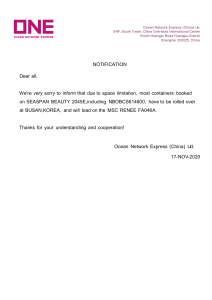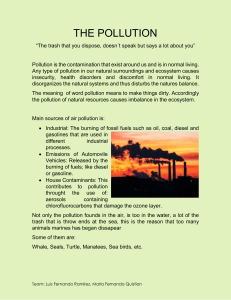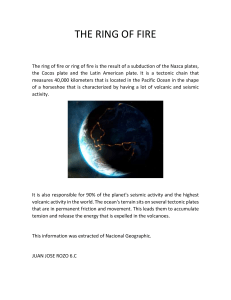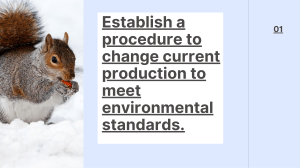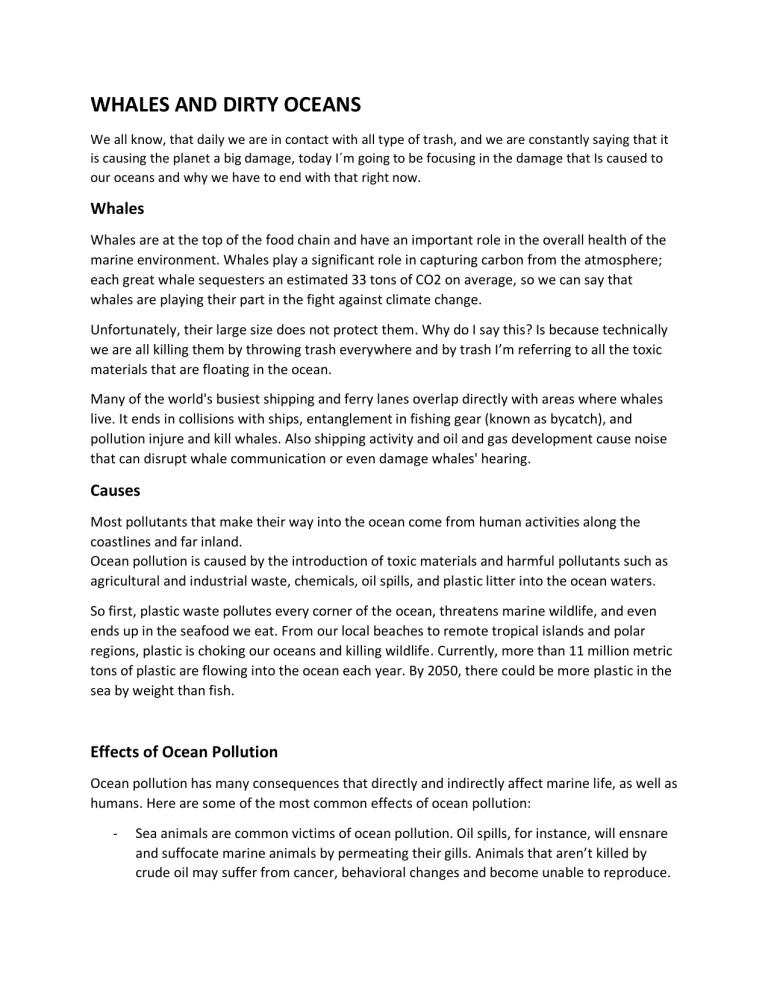
WHALES AND DIRTY OCEANS We all know, that daily we are in contact with all type of trash, and we are constantly saying that it is causing the planet a big damage, today I´m going to be focusing in the damage that Is caused to our oceans and why we have to end with that right now. Whales Whales are at the top of the food chain and have an important role in the overall health of the marine environment. Whales play a significant role in capturing carbon from the atmosphere; each great whale sequesters an estimated 33 tons of CO2 on average, so we can say that whales are playing their part in the fight against climate change. Unfortunately, their large size does not protect them. Why do I say this? Is because technically we are all killing them by throwing trash everywhere and by trash I’m referring to all the toxic materials that are floating in the ocean. Many of the world's busiest shipping and ferry lanes overlap directly with areas where whales live. It ends in collisions with ships, entanglement in fishing gear (known as bycatch), and pollution injure and kill whales. Also shipping activity and oil and gas development cause noise that can disrupt whale communication or even damage whales' hearing. Causes Most pollutants that make their way into the ocean come from human activities along the coastlines and far inland. Ocean pollution is caused by the introduction of toxic materials and harmful pollutants such as agricultural and industrial waste, chemicals, oil spills, and plastic litter into the ocean waters. So first, plastic waste pollutes every corner of the ocean, threatens marine wildlife, and even ends up in the seafood we eat. From our local beaches to remote tropical islands and polar regions, plastic is choking our oceans and killing wildlife. Currently, more than 11 million metric tons of plastic are flowing into the ocean each year. By 2050, there could be more plastic in the sea by weight than fish. Effects of Ocean Pollution Ocean pollution has many consequences that directly and indirectly affect marine life, as well as humans. Here are some of the most common effects of ocean pollution: - Sea animals are common victims of ocean pollution. Oil spills, for instance, will ensnare and suffocate marine animals by permeating their gills. Animals that aren’t killed by crude oil may suffer from cancer, behavioral changes and become unable to reproduce. - Marine animals also mistake small plastic debris for food or become entangled in or strangled by plastic bags and discarded fishing nets. As excess debris in the ocean slowly degrades over many years. Low levels of oxygen in the ocean lead to the death of ocean animals such as penguins, dolphins, whales and sharks. Ocean Pollution Solutions Given the long-term, disastrous effects of ocean pollution, anything we can do to avoid contaminating our seas is a good idea. Here are some ocean pollution solutions that can make a big difference. • Reduce chemical fertilizer use • Opt for reusable bottles and utensils • Hold a cleanup • Properly dispose of plastics and trash Whether humans live near the coasts or far inland, they are a part of the problem and the solution to ocean pollution and many countries are taking action. According to a 2018 report from the United Nations, more than sixty countries have enacted regulations to limit or ban the use of disposable plastic items. So, what are we waiting for?
